Unit 6 I'm watching TV. Section A 1a_2d课件(共31张PPT)
文档属性
| 名称 | Unit 6 I'm watching TV. Section A 1a_2d课件(共31张PPT) | 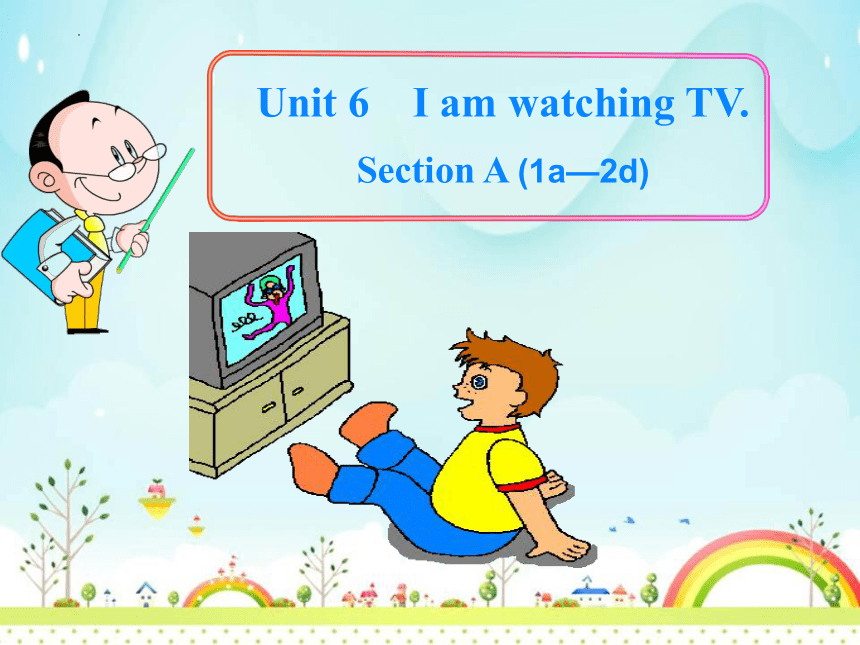 | |
| 格式 | pptx | ||
| 文件大小 | 4.9MB | ||
| 资源类型 | 教案 | ||
| 版本资源 | 人教新目标(Go for it)版 | ||
| 科目 | 英语 | ||
| 更新时间 | 2022-03-20 22:48:51 | ||
图片预览


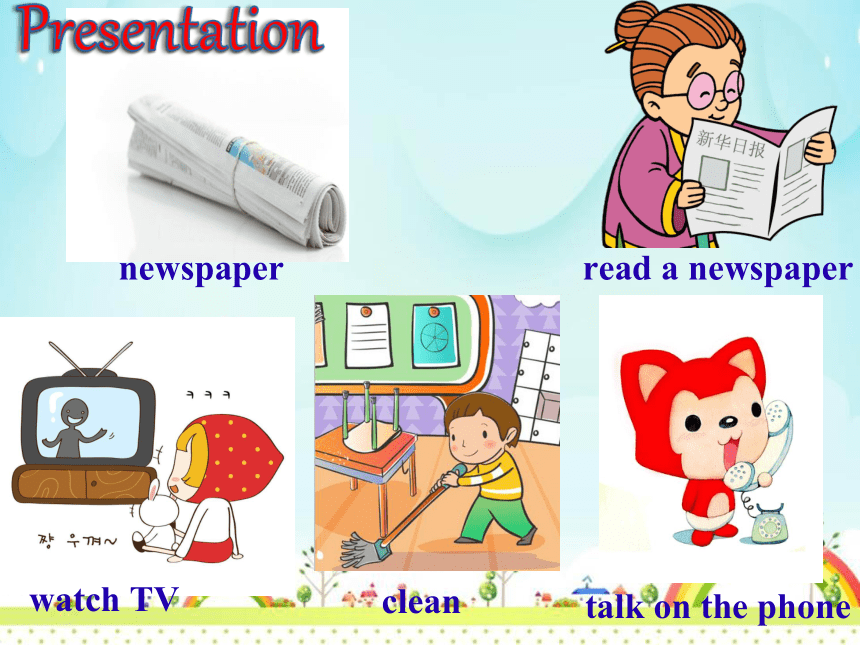
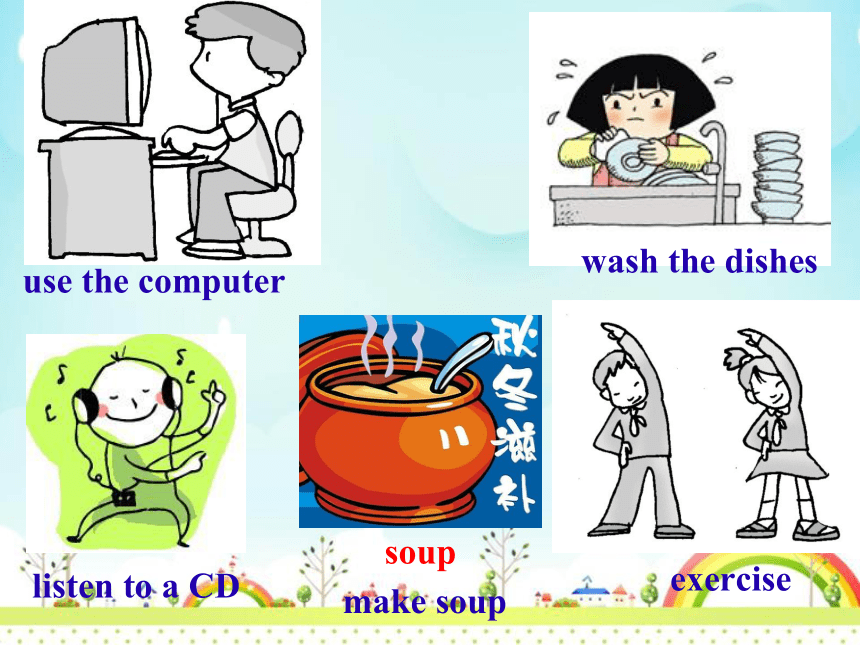
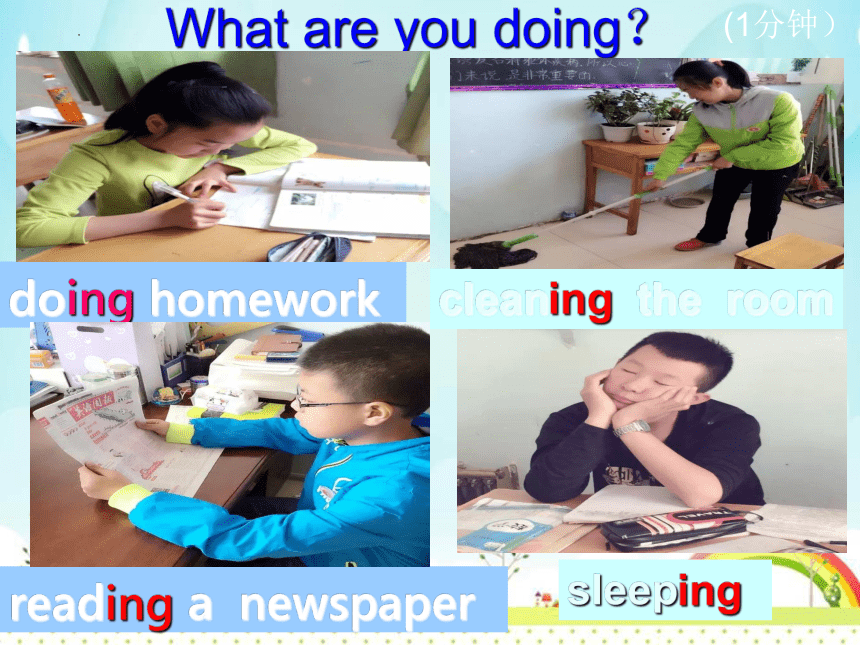
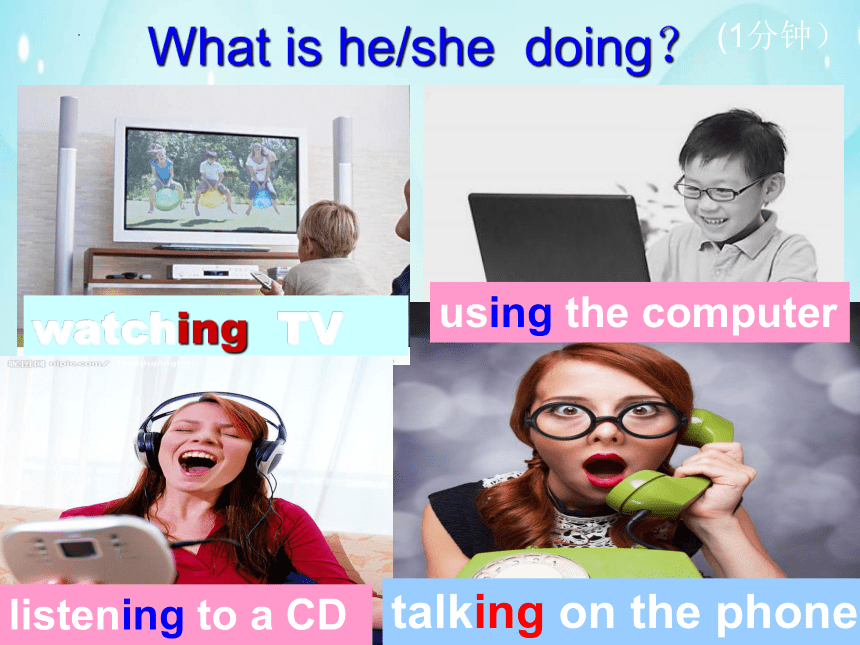
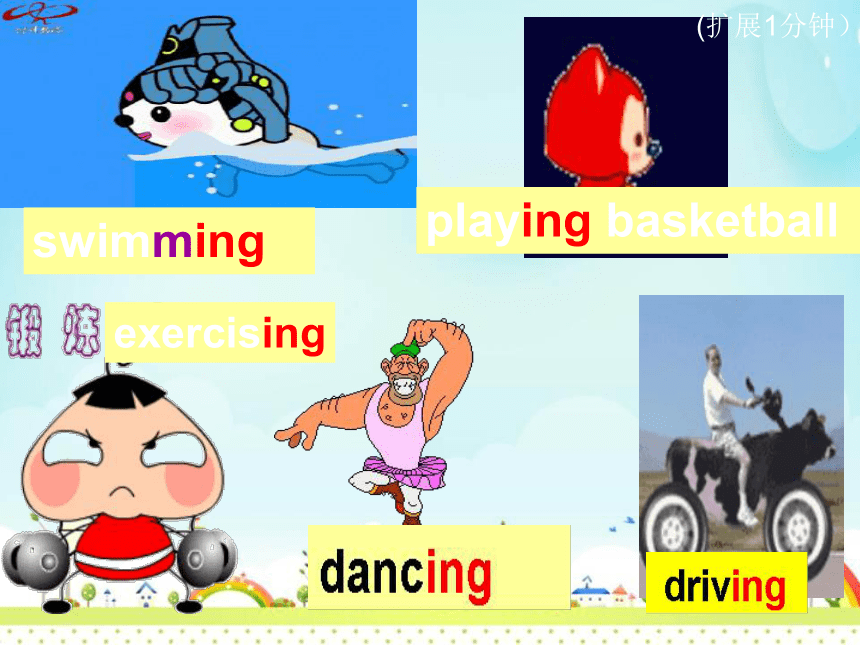
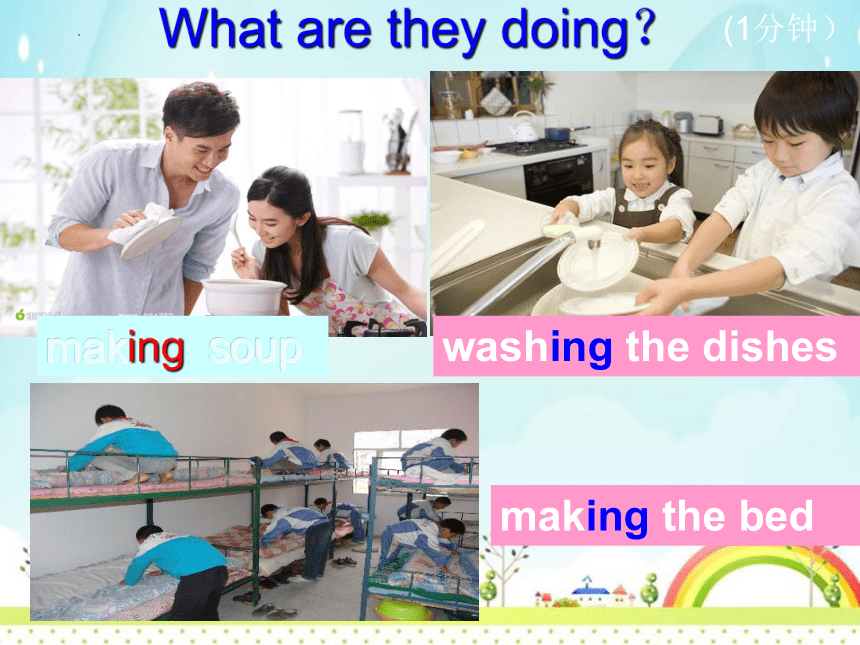
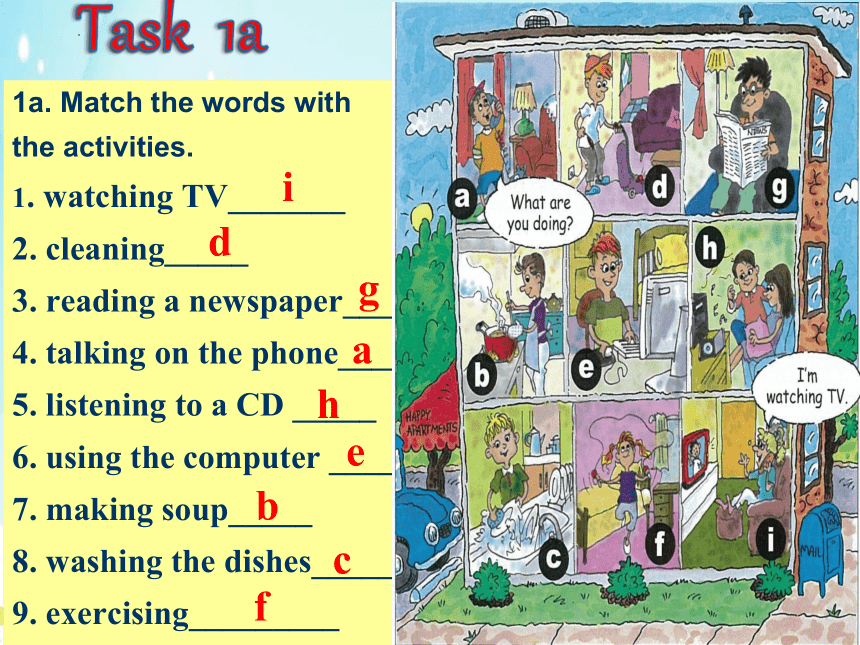
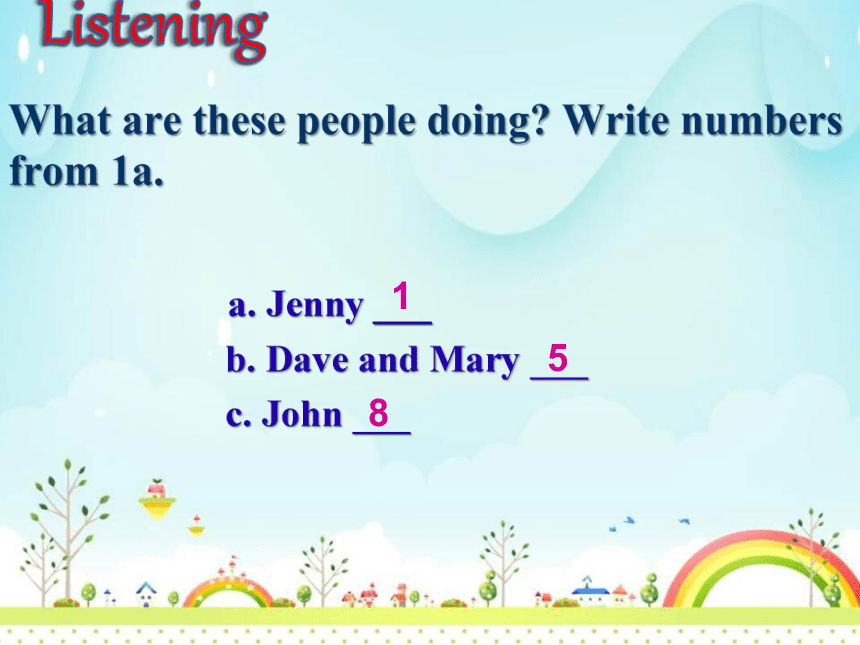
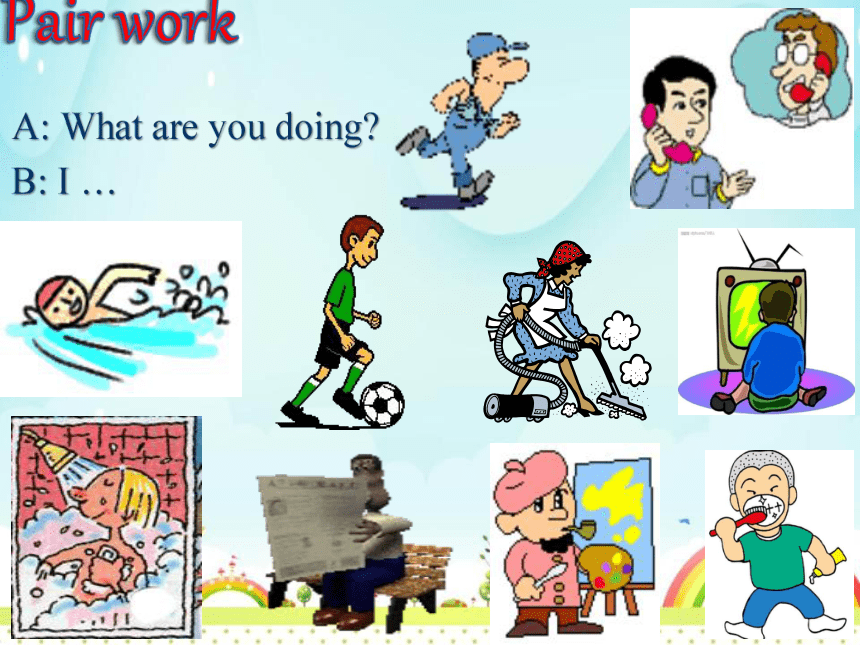
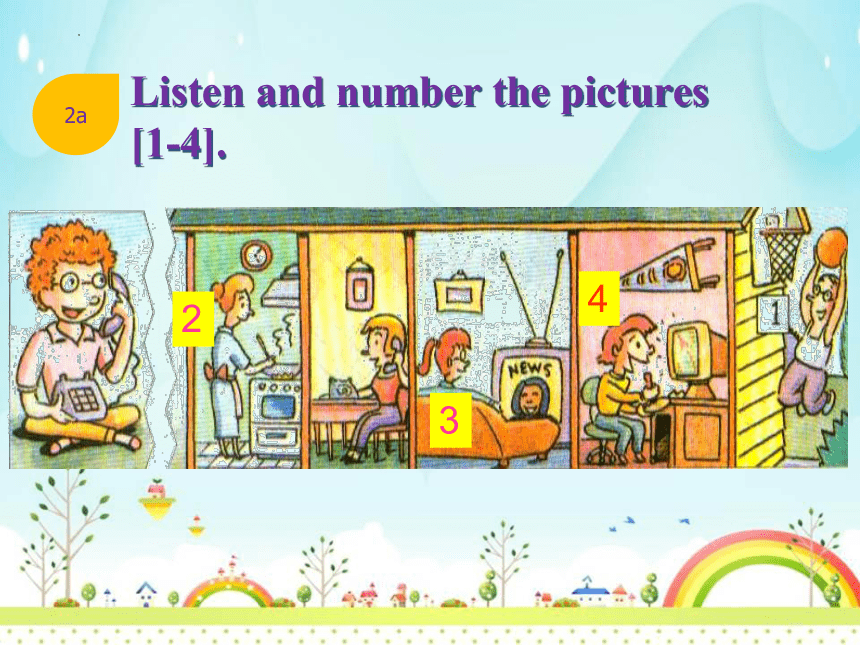
文档简介
(共31张PPT)
Unit 6 I am watching TV.
Section A (1a—2d)
教学目标
Language Goal:
Talk about what people are doing
Key words: eat out cleaning the house
join me for dinner drink tea
go to the movies tomorrow
Grammar Focus:
1.会使用现在进行时的疑问句、否定句。
2.掌握常用的打电话用语。
read a newspaper
newspaper
Presentation
clean
watch TV
talk on the phone
use the computer
wash the dishes
listen to a CD
soup
exercise
make soup
What are you doing?
cleaning the room
doing homework
reading a newspaper
sleeping
(1分钟)
using the computer
listening to a CD
watching TV
talking on the phone
What is he/she doing?
(1分钟)
playing basketball
swimming
exercising
(扩展1分钟)
making soup
washing the dishes
making the bed
What are they doing?
(1分钟)
1a. Match the words with
the activities.
1. watching TV_______
2. cleaning_____
3. reading a newspaper_______
4. talking on the phone_____
5. listening to a CD _____
6. using the computer _____
7. making soup_____
8. washing the dishes_____
9. exercising_________
f
a
h
e
c
d
i
g
b
Task 1a
What are these people doing Write numbers from 1a.
a. Jenny ___
b. Dave and Mary ___
c. John ___
1
5
8
Listening
A: What are you doing
B: I …
Pair work
3
2
4
Listen and number the pictures
[1-4].
2a
c Uncle Joe
___ Jeff
___ Mary
___ Aunt Sally
a
d
b
a. is playing computer games.
b. is cooking.
c. is playing basketball.
d. is watching TV.
Listen again. Match the names with the activities.
2b
— What’s Uncle Joe doing
— He’s playing basketball.
Talk about the people in 2a with a partner.
2c
—What’s Aunt Sally doing
—She’s cooking.
— What’s Mary doing
— She’s watching TV.
— What’s Jeff doing
— He’s playing computer games.
Rick: Hello, Rick speaking.
Steve:Hi, Rick. It’s Steve. How’s it going
Rick:Not bad, thanks. The weather’s great. What
are you doing
Steve:I’m playing baseball with some friends at
the park.
Rick:Sounds like you’re having a good time.
Role-play the conversation.
2d
Steve:Yeah. Is your brother at home
Rick:Oh, he’s not here. He’s studying at his
friend’s home. Can I take a message for him
Steve:Yes. Could you just tell him to call me back
Rick:Sure, no problem.
1.Could you just tell him to call me back 你能告诉他给我回个电话吗?(教材第38页)
(1)“Could you (please)+动词原形 ”是表示请求的交际用语,意为“(请问)你能……吗?”,其否定式是“Could you (please)+not+动词原形 ”,该句中的could不表示过去时态,只表示委婉的语气。
e.g.:Could you tell me a story 你能给我讲个故事吗?
Language Points
(2)tell sb. to do sth.意为“告诉某人做某事”。类似的结构有:ask/wish/teach sb. to do sth.要求/希望/教某人做某事。
e.g.:My parents tell me to study hard.我的父母告诉我要努力学习。
2.Can I take a message for him 要我给他捎个口信吗 (教材第38页)
message可数名词,意为“消息;信息”。常用短语有:take a message意为“捎口信,传话”;take a message for sb.意为“为某人捎个口信”;leave a message意为“留口信”;send a message意为“发送信息”。
e.g.:I'm sorry she's out right now. Can I take a message 对不起,她这会儿出去了。我可以捎个口信吗
Would you like to leave a message 你想留个口信吗
3.Sure, no problem.当然可以,没问题。(教材第38页)
No problem.常用于口语中,表示同意或愉快地回答请求,意为“没问题;小事一桩”。
e.g.:—Could you post the letter for me
你帮我寄这封信好吗
—No problem.
没问题。
【拓展】No problem.的常见用法还有以下几种:
(1)用来回答感谢,意为“不用谢;别客气;没什么”,相当于You're welcome.或Not at all.
e.g.:—Thank you very much.非常感谢你。
—No problem.没什么。
(2)用来回答道歉,意为“没关系;没什么”。
e.g.:—I'm sorry to keep you waiting.对不起,让你久等了。
—No problem.没关系。
(3)用来表示有能力做某事,意为“没问题”。
e.g.:—Can you make a kite 你会做风筝吗
—No problem.没问题。
现在分词
read
sleep
play
clean
watch
do
eat
listen
--- reading
--- sleeping
--- playing
--- cleaning
--- watching
--- doing
--- eating
--- listening
make
drive
use
dance
-- making
-- driving
-- using
-- dancing
run
swim
get
shop
sit
plan
--running
--swimming
--getting
--shopping
--sitting
--planning
Summary
tie
die
lie
-- tying
-- dying
-- lying
(观察思考0.5分钟)
现在分词构成的歌诀
现在分词用途多,进行时态不可缺。
它的构成很好记,动词后缀ing
词尾若有哑音e, 去e再加ing
一辅重读闭音节,词尾双写再加ing
还有一点要注意,变ie为y,再加ing
(总结1分钟)
tie
use
lie
sleep
swim
get
shop
eating
makeing
exciseing
running
listening
seeing
tying
useing
sleeping
swimming
getting
shopping
lying
I believe you can make the “ing” forms.
eat
make
see
excise
run
listen
write
writeing
根据句意及首字母完成单词。
(先翻译句子的大意,再根据时态和人称进行做题)
1.Look!There are children u____ the computer.
2.I always help mother wash d______.
3.Let's go s_________ in the swimming pool.
4. My mother is making s____ in the kitchen.
5.Who is t_____ on the phone It's too loud.
sing
ishes
wimming
alking
oup
Ⅱ. 用所给动词的适当形式填空
1. Look! I ___________(clean) his room.
2. Listen! Alice _________(sing) in the classroom.
3. Don’t talk. We__________(do)our homework.
4. They_____________(exercise)on the playground(操场)now.
5. My mother __________(make)breakfast for me every morning. I love her very much.
6. look! She can ______( put )on her dress.
am cleaning
is singing
are doing
are exercising
makes
put
根据要求改写下列句子。
1.He is using the computer. (改为否定句)
He ____ ______ the computer.
2.Halen is listening to a CD.(改为一般疑问句)
___ Halen _________ to a CD
3.I'm washing the dishes.(改为一般疑问句)
____ you _________ the dishes
4.They are cleaning the room.(划线部分提问)
_____ are they ______
5. We are talking on the phone. (划线部分提问)
____ are ________ on the phone
isn't using
ls listening
Are washing
What doing
---
-----------------
Who talking
1. It’s eight o’clock. The students _____ an English class.
A. have B. having
C. is having D. are having
2. Listen! The baby _____ in the next room.
A. crying B. cried
C. is crying D. cries
exercise
exercise
3. —What are they doing
—They __ on the phone.
A. talk B. talks
C. are talking D. talking
4. My mother_ cooking for us.
A. does B. are C. is D. am
总结所学过的活动,用英语写出来。
在家里打个电话询问一下你的某个好朋友正在做什么?然后用英语编写成对话。
Homework
Unit 6 I am watching TV.
Section A (1a—2d)
教学目标
Language Goal:
Talk about what people are doing
Key words: eat out cleaning the house
join me for dinner drink tea
go to the movies tomorrow
Grammar Focus:
1.会使用现在进行时的疑问句、否定句。
2.掌握常用的打电话用语。
read a newspaper
newspaper
Presentation
clean
watch TV
talk on the phone
use the computer
wash the dishes
listen to a CD
soup
exercise
make soup
What are you doing?
cleaning the room
doing homework
reading a newspaper
sleeping
(1分钟)
using the computer
listening to a CD
watching TV
talking on the phone
What is he/she doing?
(1分钟)
playing basketball
swimming
exercising
(扩展1分钟)
making soup
washing the dishes
making the bed
What are they doing?
(1分钟)
1a. Match the words with
the activities.
1. watching TV_______
2. cleaning_____
3. reading a newspaper_______
4. talking on the phone_____
5. listening to a CD _____
6. using the computer _____
7. making soup_____
8. washing the dishes_____
9. exercising_________
f
a
h
e
c
d
i
g
b
Task 1a
What are these people doing Write numbers from 1a.
a. Jenny ___
b. Dave and Mary ___
c. John ___
1
5
8
Listening
A: What are you doing
B: I …
Pair work
3
2
4
Listen and number the pictures
[1-4].
2a
c Uncle Joe
___ Jeff
___ Mary
___ Aunt Sally
a
d
b
a. is playing computer games.
b. is cooking.
c. is playing basketball.
d. is watching TV.
Listen again. Match the names with the activities.
2b
— What’s Uncle Joe doing
— He’s playing basketball.
Talk about the people in 2a with a partner.
2c
—What’s Aunt Sally doing
—She’s cooking.
— What’s Mary doing
— She’s watching TV.
— What’s Jeff doing
— He’s playing computer games.
Rick: Hello, Rick speaking.
Steve:Hi, Rick. It’s Steve. How’s it going
Rick:Not bad, thanks. The weather’s great. What
are you doing
Steve:I’m playing baseball with some friends at
the park.
Rick:Sounds like you’re having a good time.
Role-play the conversation.
2d
Steve:Yeah. Is your brother at home
Rick:Oh, he’s not here. He’s studying at his
friend’s home. Can I take a message for him
Steve:Yes. Could you just tell him to call me back
Rick:Sure, no problem.
1.Could you just tell him to call me back 你能告诉他给我回个电话吗?(教材第38页)
(1)“Could you (please)+动词原形 ”是表示请求的交际用语,意为“(请问)你能……吗?”,其否定式是“Could you (please)+not+动词原形 ”,该句中的could不表示过去时态,只表示委婉的语气。
e.g.:Could you tell me a story 你能给我讲个故事吗?
Language Points
(2)tell sb. to do sth.意为“告诉某人做某事”。类似的结构有:ask/wish/teach sb. to do sth.要求/希望/教某人做某事。
e.g.:My parents tell me to study hard.我的父母告诉我要努力学习。
2.Can I take a message for him 要我给他捎个口信吗 (教材第38页)
message可数名词,意为“消息;信息”。常用短语有:take a message意为“捎口信,传话”;take a message for sb.意为“为某人捎个口信”;leave a message意为“留口信”;send a message意为“发送信息”。
e.g.:I'm sorry she's out right now. Can I take a message 对不起,她这会儿出去了。我可以捎个口信吗
Would you like to leave a message 你想留个口信吗
3.Sure, no problem.当然可以,没问题。(教材第38页)
No problem.常用于口语中,表示同意或愉快地回答请求,意为“没问题;小事一桩”。
e.g.:—Could you post the letter for me
你帮我寄这封信好吗
—No problem.
没问题。
【拓展】No problem.的常见用法还有以下几种:
(1)用来回答感谢,意为“不用谢;别客气;没什么”,相当于You're welcome.或Not at all.
e.g.:—Thank you very much.非常感谢你。
—No problem.没什么。
(2)用来回答道歉,意为“没关系;没什么”。
e.g.:—I'm sorry to keep you waiting.对不起,让你久等了。
—No problem.没关系。
(3)用来表示有能力做某事,意为“没问题”。
e.g.:—Can you make a kite 你会做风筝吗
—No problem.没问题。
现在分词
read
sleep
play
clean
watch
do
eat
listen
--- reading
--- sleeping
--- playing
--- cleaning
--- watching
--- doing
--- eating
--- listening
make
drive
use
dance
-- making
-- driving
-- using
-- dancing
run
swim
get
shop
sit
plan
--running
--swimming
--getting
--shopping
--sitting
--planning
Summary
tie
die
lie
-- tying
-- dying
-- lying
(观察思考0.5分钟)
现在分词构成的歌诀
现在分词用途多,进行时态不可缺。
它的构成很好记,动词后缀ing
词尾若有哑音e, 去e再加ing
一辅重读闭音节,词尾双写再加ing
还有一点要注意,变ie为y,再加ing
(总结1分钟)
tie
use
lie
sleep
swim
get
shop
eating
makeing
exciseing
running
listening
seeing
tying
useing
sleeping
swimming
getting
shopping
lying
I believe you can make the “ing” forms.
eat
make
see
excise
run
listen
write
writeing
根据句意及首字母完成单词。
(先翻译句子的大意,再根据时态和人称进行做题)
1.Look!There are children u____ the computer.
2.I always help mother wash d______.
3.Let's go s_________ in the swimming pool.
4. My mother is making s____ in the kitchen.
5.Who is t_____ on the phone It's too loud.
sing
ishes
wimming
alking
oup
Ⅱ. 用所给动词的适当形式填空
1. Look! I ___________(clean) his room.
2. Listen! Alice _________(sing) in the classroom.
3. Don’t talk. We__________(do)our homework.
4. They_____________(exercise)on the playground(操场)now.
5. My mother __________(make)breakfast for me every morning. I love her very much.
6. look! She can ______( put )on her dress.
am cleaning
is singing
are doing
are exercising
makes
put
根据要求改写下列句子。
1.He is using the computer. (改为否定句)
He ____ ______ the computer.
2.Halen is listening to a CD.(改为一般疑问句)
___ Halen _________ to a CD
3.I'm washing the dishes.(改为一般疑问句)
____ you _________ the dishes
4.They are cleaning the room.(划线部分提问)
_____ are they ______
5. We are talking on the phone. (划线部分提问)
____ are ________ on the phone
isn't using
ls listening
Are washing
What doing
---
-----------------
Who talking
1. It’s eight o’clock. The students _____ an English class.
A. have B. having
C. is having D. are having
2. Listen! The baby _____ in the next room.
A. crying B. cried
C. is crying D. cries
exercise
exercise
3. —What are they doing
—They __ on the phone.
A. talk B. talks
C. are talking D. talking
4. My mother_ cooking for us.
A. does B. are C. is D. am
总结所学过的活动,用英语写出来。
在家里打个电话询问一下你的某个好朋友正在做什么?然后用英语编写成对话。
Homework
同课章节目录
- Unit 1 Can you play the guitar?
- Section A
- Section B
- Unit 2 What time do you go to school?
- Section A
- Section B
- Unit 3 How do you get to school?
- Section A
- Section B
- Unit 4 Don't eat in class.
- Section A
- Section B
- Unit 5 Why do you like pandas?
- Section A
- Section B
- Unit 6 I'm watching TV.
- Section A
- Section B
- Review of Units 1-6
- Unit 7 It's raining!
- Section A
- Section B
- Unit 8 Is there a post office near here?
- Section A
- Section B
- Unit 9 What does he look like?
- Section A
- Section B
- Unit 10 I'd like some noodles.
- Section A
- Section B
- Unit 11 How was your school trip?
- Section A
- Section B
- Unit 12 What did you do last weekend?
- Section A
- Section B
